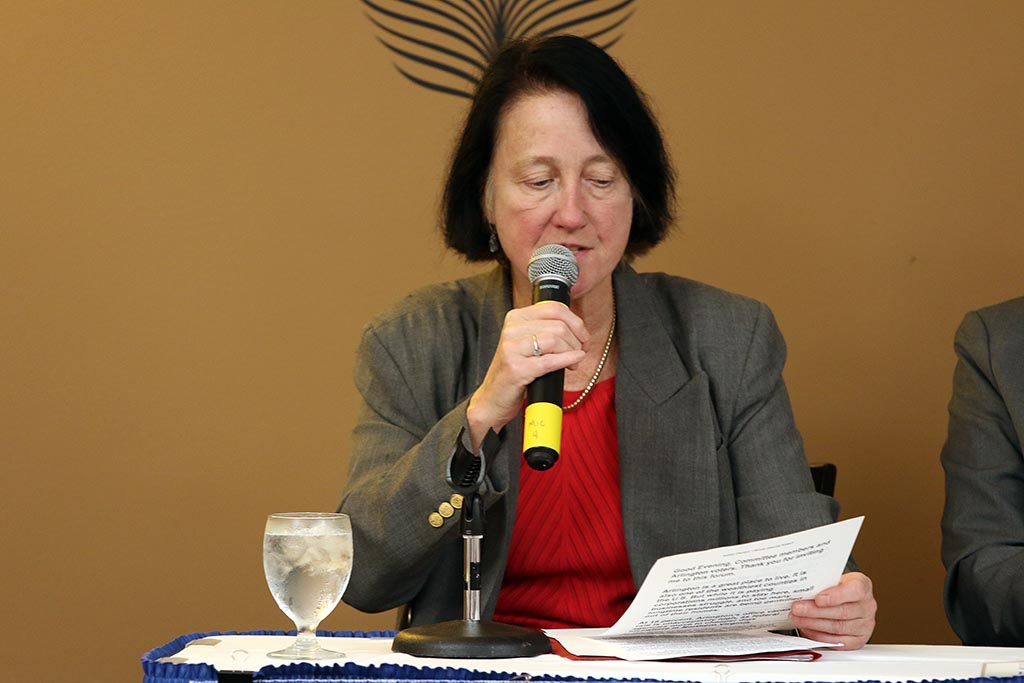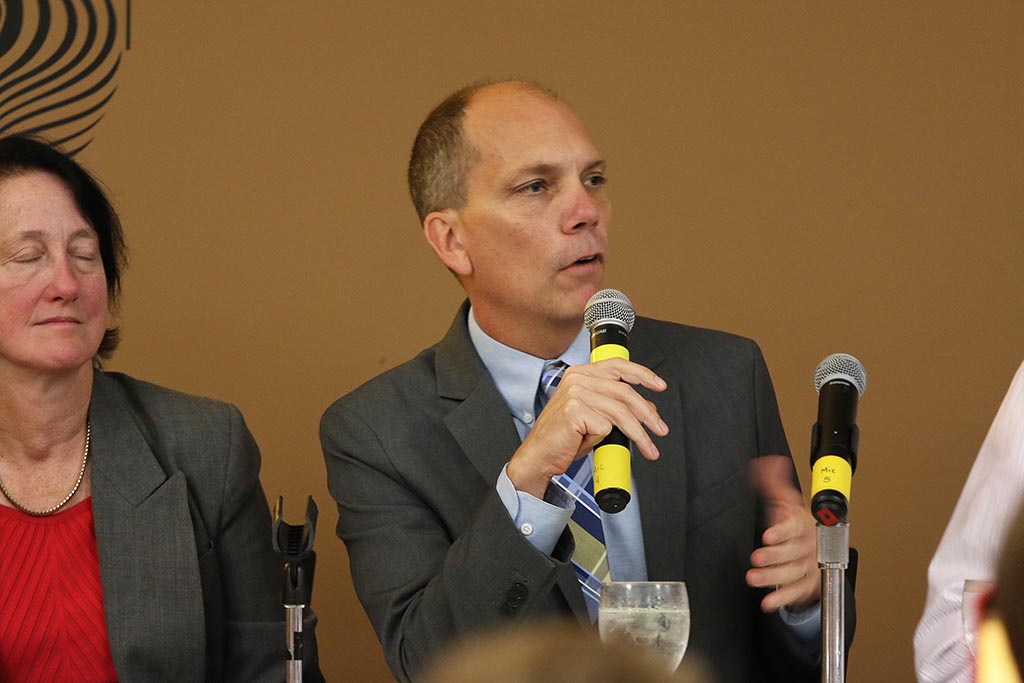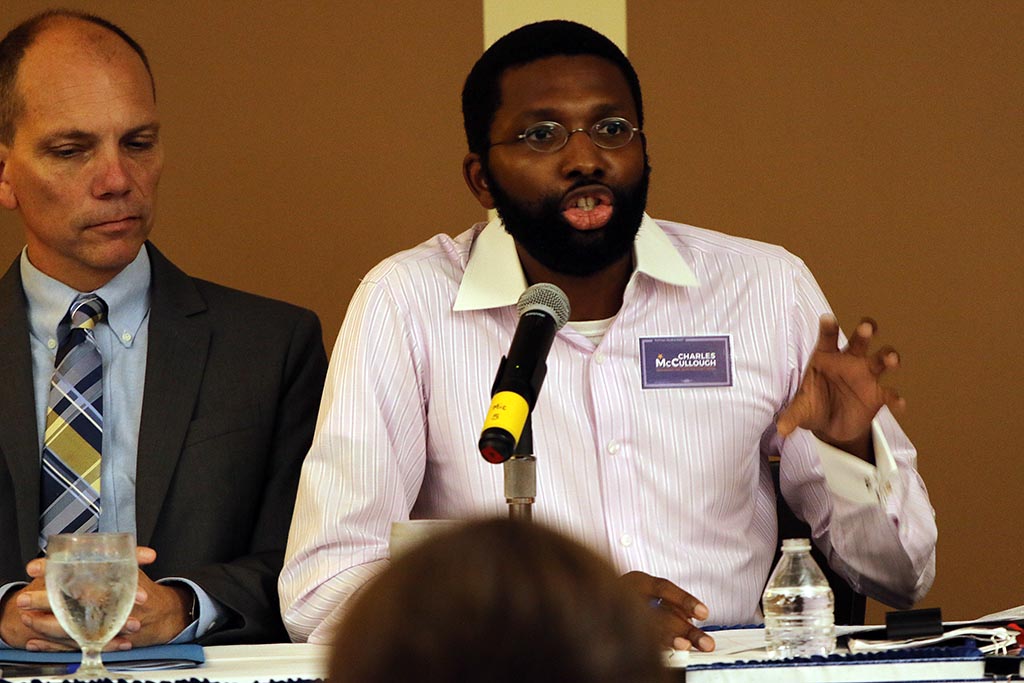Earlier this month, the candidates for Arlington County Board faced a bevy of tough questions at a forum hosted by the Arlington Committee of 100.
But after the audience went home and the microphones were turned off, that wasn’t the end of the candidates’ work.
Attendees submitted written questions to the candidates throughout the evening, but due to time constraints, they could not all be answered. So with Election Day just two weeks away, ARLnow collated the unanswered questions and emailed the three County Board candidates for their responses.
(A similar article with responses to follow-up questions for the three School Board candidates will follow in the near future.)
Candidates’ unedited responses are below.
1. What are the challenges you would tackle in the area of affordable housing?
Audrey Clement:
The biggest challenge would be to convince my fellow Board Members to:
1) amend the tax code to create Housing Conservation Districts (HCDs) where landlords would be given incentives to rehab rather than tear down existing affordable housing; and
2) loosen accessory dwelling unit (ADU) regulations to allow renting space in private homes, while limiting the impacts of such rentals on residential neighborhoods.
Erik Gutshall:
While Arlington is a great place to live, it’s undeniably getting harder and harder to put down roots here and stay rooted if a smaller home is what you need as your family shrinks. Housing affordability is a critical component of the progressive values I espouse; it is also an essential component of a strong middle class in Arlington.
As a County Board Member, I will follow a multi-point plan that includes: (1) the creation of medium density “missing middle” housing along our major commercial corridors, (2) modernization of the our zoning ordinance to enable home sharing and facilitate aging-in-place, (3) tireless support for the 2015 Affordable Housing Master Plan, and (4) continued annual funding for the Affordable Housing Investment Fund and Housing grants. I will also continue the existing, strong partnerships with non-profit housing providers as well as others in the non-profit community who provide services to Arlington residents living in affordable housing.
As detailed in my “missing middle” housing proposal, Arlington cannot subsidize our way to mass affordability, instead we must unlock the potential of the market to deliver the housing we need. The good news is that there is ample opportunity in Arlington for us to create the neighborhood-scale housing and retail areas known as “missing middle.” The missing middle framework uses market forces to diversify our housing supply and responds to the needs of residents both young and old. These modestly scaled lofts, stacked flats, co-ops, and micro units are designed to preserve neighborhood character and can fit into the edges of single-family neighborhoods and along commercial corridors, with ground floor retail and restaurants to serve adjacent homes.
Charles McCullough:
In the area of affordable housing, I would tackle these three main challenges:
Ensuring that developers pay their fair share:
- Increase the zoning fee for apartment developers who forego affordable units, as it is currently just 1/3 of the fee allowed under state law.
- Shift housing assistance funds to direct housing grants in order to support more residents earning less than 40% of the area median income.
Approaching certified and market rate housing with a multifaceted approach:
- Incentivize the development of multifamily structures designed to address senior mobility needs, as well as co-living spaces designed to meet the needs of young professionals.
- Ensure accessory dwellings become a viable option for housing while not contributing to parking and density concerns.
- Explore Housing Conservation Districts as a way to maintain larger-scale areas of market rate affordability with careful caution not to unintentionally make these areas into suburban ghettos.
Providing housing affordability programs to address the needs of low- and middle-income Arlingtonians:
- Develop new homeowner affordability programs to support community/developer partnership models like community land trusts and low-equity housing cooperatives.
- Bolster existing homeowner assistance programs that enable our teachers and first responders to live in the communities where they serve.
As a progressive, independent voice on the Arlington County Board, I have the ability to advocate for a variety of reasonable housing affordability solutions that “Put People First” instead of defaulting to developers’ demands.
2. What skills from your day job would you bring to the County Board?
Clement:
For the past twenty plus years I’ve been employed as a statistical programmer on a contractual basis by various federal government agencies. My job is demanding. It not only requires technical skill, it also requires analytical ability to assess client needs and offer optimal solutions.
These latter two skills are directly applicable to local government administration, particularly as it pertains to oversight of the budget process, and I look forward to applying those skills on the Board, for the betterment of Arlington’s citizens.
In addition I have a Ph.D. in Political Science from Temple University in 1993 with a focus on American voting behavior, as well as experience working on the Hill. Thus I have the political know how to lobby for and implement policies beneficial to all Arlingtonians.
Gutshall:
Owning a small business has given me the opportunity to wear many different hats. On any given day, I am human resources director, chief financial officer, or network engineer. I have to understand legal contracts, taxes, and regulatory requirements. My knowledge, skills, and experience in all the facets of a business has grown as my company has grown to 10 employees.
The chief skill that runs through almost everything I do on a day to day basis, however, is communicating with people. Being an effective leader, whether business, or civic requires excellent communication. I enjoy being able to communicate technical information to my clients, and nuanced customer requirements to my employees. It’s rewarding to see that light bulb go off when someone truly understands. On the Planning Commission, I try to be a voice for the community when I think that a developer, or county staff doesn’t understand. Of course, great communication is fundamentally two-way, which requires that I be a good listener first. I have found this to always be true – with my wife, my customers, my employees, and with citizens.
McCullough:
Three of my strongest skills from my day job that I would bring to the county board are decision making, strategic planning, and relationship building.
- I know how to make balanced decisions. As board chair of the US Postal Service Federal Credit Union, I led the organization to implement new financial services providing economic relief to members in Arlington and beyond while maintaining strong reserves.
- I know how to conduct inclusive strategic planning that results in cost-effective responses to long-term societal challenges. As an attorney, I led the development phase of a multimillion-dollar, Gates Foundation-funded initiative to improve education quality.
- I know how to build mutually beneficial relationships that attract new businesses to communities desiring economic growth. As an embassy staffer, I helped forge partnerships between cutting-edge tech startups and Fortune 500 companies.
These skills and my well-rounded background will help the board craft policies that anticipate and address the challenges facing Arlington.
3. What is your vision and strategy for addressing the opioid addiction crisis?
Clement:
This question came up at a recent School Board forum. First, I would pursue a strong drug avoidance educational program as part of hygiene instruction in our public schools. Reaching our student population is crucial, and I am sure parents and caregivers would appreciate that, too.
As for adult opioid users and abusers, enforcement of existing drug laws is paramount, with an emphasis on jail time for traffickers and rehabilitation for users.
Gutshall:
I am gravely concerned that opioid addiction has the potential to overwhelm our human services infrastructure with devastating consequences much as the crack epidemic of the late 1980’s gutted many communities with consequences still reverberating today. As we learned at the recent Opioid Community Town Hall, this crisis is not limited to the urban poor, this one is right in our own living rooms.
Recognizing that the most successful response will be coordinated across multiple agencies, the most important role of the County Board in addressing the crisis of opioid addiction is to ensure that the Department of Human Services, Courts, Police and Fire Departments, Arlington Public Schools, hospitals, and our non-profit partners all have the resources, data, and action plans they need. I also support designating a Deputy County Manager to lead our coordinated response, the Arlington Addiction Recovery Initiative.
As a parent with teens and tweens, I am grateful our schools have taken necessary initial steps and are ready to play a crucial role in educating our youth and their parents of the dangers, warning signs, and treatment options for opioid abuse. I support efforts to prioritize treatment over prosecution for addicts while also assigning detectives to an FBI Task Force to specifically target opioid distributors. I have confidence that our highly professional non-profit and medical providers will train and follow updated best practices for prevention and treatment of addiction. Finally, Arlington has the wherewithal to collect, analyze, and share real-time data to optimize our response across stakeholders.
Unfortunately, there is no easy solution to a crisis deeply imbedded in larger national issues, but Arlington must act swiftly and decisively to save lives of our children, parents, friends and neighbors.
McCullough:
I envision an Arlington that has effectively implemented a national model for addressing the opioid crisis, returning opioid overdose rates to precrisis levels within one year and eliminating opioid overdoses in the county by 2021.
As an educator, attorney, and son of a police officer, I recognize opioid addiction as a public health emergency which Arlington must address with a three-pronged strategy:
- Through education initiatives Arlington should work with schools, community groups, and houses of worship to educate the public on the proper disposal of enabling medications and to assist those showing signs of addiction.
- Through outreach programs targeting addicts and their families, Arlington should offer treatment plans and training on how to use Nalaxone to prevent overdoses.
- Through partnerships with other local law enforcement agencies, nonprofits, and national grantmakers, Arlington should continue to evaluate and refine the existing Arlington Addiction Recovery Initiative to ensure the use of best practices, cost efficiency, and access to additional non-taxpayer-based funding.
4. What, specifically, will you do to improve the quality of life for seniors in Arlington? (Note that last few years, 2 senior centers have been closed.)
Clement:
Probably the greatest challenge for seniors in Arlington County is their tax burden. If elected, I am going to say no to tax rate increases for the foreseeable future.
I am also going to try to curtail rising property assessments while, at the same time, working to expand the number of affordable market rate housing units in the county. And for those seniors who are renting, let’s remember that property tax increases have the unwanted side effect of forcing landlords to increase rents. If we can limit those tax increases we can keep rent increases to a minimum. That’s a win-win for everyone.
Another challenge for seniors is their ability to get around in an increasingly congested county. If elected, I am going to address that concern by requiring an impact analysis for every major site plan development project, in order to determine its actual benefit to the people of this county.
Let me be clear. I am going to insist that the Board get serious about mitigating the impact of development on our streets, schools, parks and public safety.
Gutshall:
Creating a healthy community calls for an Arlington that is livable for all ages. We need to accommodate the needs of Arlingtonians of all ages, and implement initiatives to improve housing, walkability, health care access, tax burdens, lifelong education and inter-generational social connections. Focusing on older adults is especially important because the gift of increased longevity means that these older residents have years of productivity ahead of them.
Please see my full issue statement on Arlington’s older adults at my website. Here are some highlights of what I would do on the County Board; I will:
- Encourage and incentivize homeowners and builders to make homes adaptable by creating flexible spaces to accommodate changing needs and physical abilities, and
- Simplify zoning and practical requirements to make it easier for older adults to share their homes and create space for caregivers.
- Support and strengthen Arlington’s Real Estate Tax Relief (RETR) program
- Advocate for Safe Streets, making crosswalks more visible, adding pedestrian islands in the middle of busy streets, and shortening the distance to cross busy roads.
- Support services such as Super Senior Taxi and encouraging companies (ex: Red Top Cab) that provide older adults with discounts or other workable options.
- Promote health care and other services that enable aging at home, help fight isolation and support caregivers.
- Work with Arlington Neighborhood Village, George Mason University, Virginia Hospital, Goodwin House, innovative startups, and others on new public policy and initiatives to promote older adults’ health.
- Support Arlington County services such as adult day programs, nutrition programs, mental health support and personal advocates.
- Promote good quality of life through inter-generational interaction, recreation, art and music, lifelong learning and community participation. Staying physically active, enjoying new experiences, and being part of a social network help all of us as we age.
- Co-locate senior programs with our schools to leverage the talent and wisdom of older adults to the benefit of young students eager to learn.
- Support Arlington programs (ex: Encore Learning, 55+) that offer appealing classes and experiences for a range of older adults.
McCullough:
Arlington’s seniors are a growing, vibrant, and active community. Arlington should work more closely with our senior community to harness their creativity, knowhow, and wealth of experience so that they can age-in-place with dignity. To improve the quality of life of seniors, Arlington must focus in the following areas:
Preparing health and human services for the future:
- Fund and plan for the growth of existing housing, health/dental, and transportation programs that enable seniors on a fixed income to afford the costs associated with independent living.
- Expand programs that develop our own first responders and attract trained first responders from other jurisdictions to prepare for increased demand for emergency services.
Creating programs to address senior needs:
- Utilize a joint-use facility model for senior centers to maximize space as well as more efficiently provide access to health and human services.
- Develop companionship-building initiatives, such as regular meals and senior-only areas in facilities, that address depression among seniors.
Maximizing opportunities for seniors:
- Update and develop a more comprehensive Elder Readiness Master Plan to address how the county intends to coordinate and advertise services.
- Revise one-size-fits-all business regulations to make it easier for seniors to open small businesses for supplementary income or as a second career.




